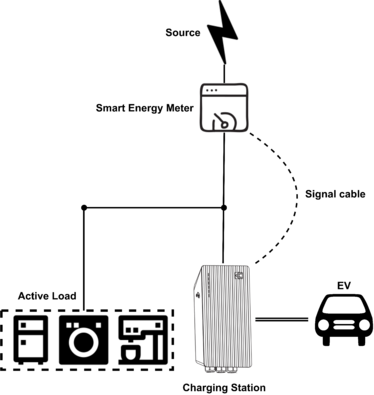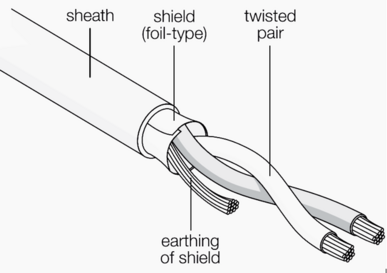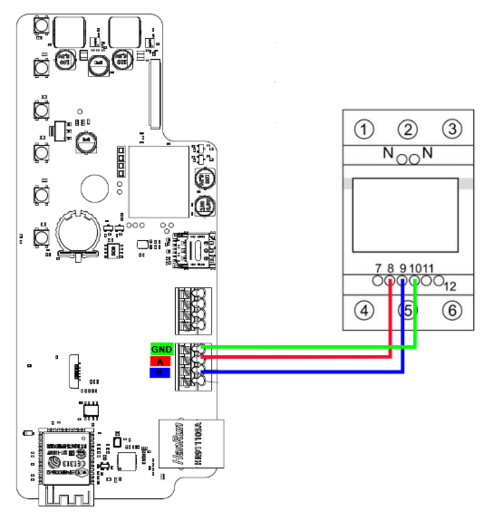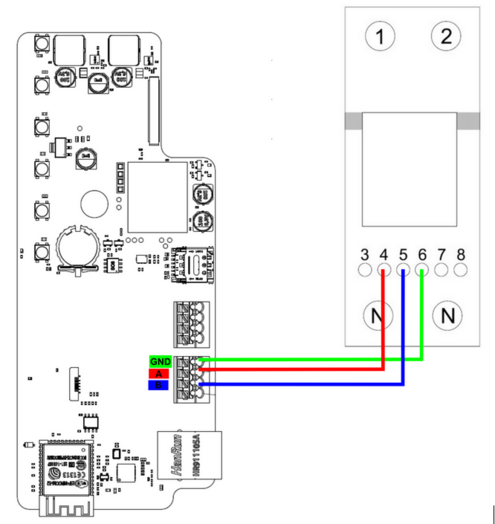Difference between revisions of "Dynamic Load Balancing"
| (12 intermediate revisions by the same user not shown) | |||
| Line 1: | Line 1: | ||
| − | == DYNAMIC LOAD BALANCING == | + | === DYNAMIC LOAD BALANCING === |
TeltoCharge have the ability to communicate with dedicated smart energy meter and regarding to its readings, adjust used electrical power. Such functionality allows to protect house electrical grid from overload in peak hours and optimize energy usage to meet user habits. Smart energy meter should always be installed in source electrical cabinet as showed below. | TeltoCharge have the ability to communicate with dedicated smart energy meter and regarding to its readings, adjust used electrical power. Such functionality allows to protect house electrical grid from overload in peak hours and optimize energy usage to meet user habits. Smart energy meter should always be installed in source electrical cabinet as showed below. | ||
[[File:Dynamic Load Balancing Conection Schematic.png|alt=|center|frameless|395x395px]] | [[File:Dynamic Load Balancing Conection Schematic.png|alt=|center|frameless|395x395px]] | ||
| Line 10: | Line 10: | ||
]]'''Note:''' ''Communication cable should be integrated with power cable.'' | ]]'''Note:''' ''Communication cable should be integrated with power cable.'' | ||
| − | == Supported energy meters == | + | === Supported energy meters === |
| − | In order to strive for wider applicability and compatibility, we constantly test and add new supported devices into list. All of the supported Energy meters and schematics how to connect them are provided | + | In order to strive for wider applicability and compatibility, we constantly test and add new supported devices into list. All of the supported Energy meters and schematics how to connect them are provided bellow. |
| − | === TeltoCharge supported | + | ==== TeltoCharge supported energy meter list: ==== |
| − | + | {| class="wikitable" style="text-align: center; border: 1px solid #dddddd; font-family: arial, sans-serif; width: 70%;" | |
| − | {| class="wikitable" style="text-align: center; border: 1px solid #dddddd; font-family: arial, sans-serif; width: | ||
|- | |- | ||
! style="background-color: #0054A6; color:#FFFFFF; padding: 8px;" | Energy meter manufacturer | ! style="background-color: #0054A6; color:#FFFFFF; padding: 8px;" | Energy meter manufacturer | ||
| − | ! style="background-color: #0054A6; color:#FFFFFF; padding: 8px;" | | + | ! style="background-color: #0054A6; color:#FFFFFF; padding: 8px;" | Type |
| − | ! style="background-color: #0054A6; color:#FFFFFF; padding: 8px;" | | + | ! style="background-color: #0054A6; color:#FFFFFF; padding: 8px;" | Supported model for Dynamic load balancing |
| − | ! style="background-color: #0054A6; color:#FFFFFF; padding: 8px;" | | + | ! style="background-color: #0054A6; color:#FFFFFF; padding: 8px;" | 1/3 phase |
| − | + | ! style="background-color: #0054A6; color:#FFFFFF; padding: 8px;" | Datasheet | |
| + | |- | ||
| + | | style="padding: 2px;" rowspan="3" | Carlo Gavazzi series 1 | ||
| + | | style="padding: 2px;" rowspan="2" | EM111 <br> | ||
| + | | style="padding: 1px;" | [https://wiki.teltonika-energy.com/images/b/b7/EM111.PNG EM111-DIN AV7/AV8 1 X S1 PF A/B (MID CERTIFIED)] | ||
| + | | style="padding: 2px;" rowspan="3" | 1 phase <br> | ||
| + | | style="padding: 2px;" rowspan="2" | [https://www.gavazziautomation.com/images/PIM/DATASHEET/ENG/EM111%20DS%20ENG%20170616.pdf EM111] | ||
| + | |- | ||
| + | | style="padding: 2px;" | [https://wiki.teltonika-energy.com/images/d/dc/EM111_Standard.PNG EM111-DIN AV7/AV8 1 X S1 X (NOT MID CERTIFIED)] | ||
| + | |- | ||
| + | | style="padding: 2px;" | ET112 | ||
| + | | style="padding: 1px;" | [https://wiki.teltonika-energy.com/images/6/67/ET112.PNG ET112-DIN AV0/AV1 1 X S1 X (NOT MID CERTIFIED)] | ||
| + | | style="padding: 2px;" | [https://www.gavazziautomation.com/images/PIM/DATASHEET/ENG/ET112_DS_ENG.PDF ET112] | ||
| + | |- | ||
| + | | style="padding: 2px;" rowspan="6" | Carlo Gavazzi series 3 | ||
| + | | style="padding: 2px;" rowspan="2"| EM330 <br> | ||
| + | | style="padding: 1px;" | [https://wiki.teltonika-energy.com/images/d/dc/EM330.PNG EM330-DIN AV5 3 H S1 PF A/B (MID CERTIFIED)] | ||
| + | | style="padding: 2px;" rowspan="6" | 3 phase | ||
| + | | style="padding: 2px;" rowspan="2" | [https://www.gavazzionline.com/pdf/EM330.pdf EM330] | ||
| + | |- | ||
| + | | style="padding: 1px;" | [https://wiki.teltonika-energy.com/images/b/b4/EM330_Standard.PNG EM330-DIN AV5 3 H S1 X (NOT MID CERTIFIED)] | ||
| + | |- | ||
| + | | style="padding: 2px;" rowspan="2" | EM340 <br> | ||
| + | | style="padding: 1px;" | [https://wiki.teltonika-energy.com/images/a/a6/EM340.PNG EM340-DIN AV2 3 X S1 PF A/B (MID CERTIFIED)] | ||
| + | | style="padding: 2px;" rowspan="2" | [https://www.gavazzi.no/wp-content/uploads/EM340_DS_ENG.pdf EM340] | ||
|- | |- | ||
| − | | style="padding: | + | | style="padding: 1px;" | [https://wiki.teltonika-energy.com/images/archive/a/a9/20230306120205%21EM340_Standard.PNG EM340-DIN AV2 3 X S1 X (NOT MID CERTIFIED)] |
| − | |||
| − | |||
| − | |||
| − | |||
|- | |- | ||
| − | | style="padding: 2px;" | | + | | style="padding: 2px;" | ET330 |
| − | | style="padding: | + | | style="padding: 1px;" | [https://wiki.teltonika-energy.com/images/a/ad/ET330.PNG ET330-DIN AV5 3 H S1 X (NOT MID CERTIFIED)] |
| − | | style="padding: 2px;" | [ | + | | style="padding: 2px;" | [https://www.gavazzionline.com/pdf/ET330_DS_ENG.pdf ET330] |
| − | |||
| − | |||
|- | |- | ||
| − | | style="padding: 2px;" | | + | | style="padding: 2px;" | ET340 |
| − | | style="padding: | + | | style="padding: 1px;" | [https://wiki.teltonika-energy.com/images/2/21/ET340.PNG ET340-DIN AV2 3 X S1 X (NOT MID CERTIFIED)] |
| − | | style="padding: 2px;" | [ | + | | style="padding: 2px;" | [https://www.gavazziautomation.com/docs/pim/DATASHEET/DEU/ET340_DS_DEU.pdf ET340] |
| − | |||
| − | |||
|- | |- | ||
| − | | style="padding: 2px;" | | + | | style="padding: 2px;" rowspan="2" | Carlo Gavazzi series 5 |
| − | | style="padding: 2px;" | | + | | style="padding: 2px;" | EM530 <br> |
| − | | style="padding: 2px;" | | + | | style="padding: 2px;" | |
| − | | style="padding: 2px;" | | + | | style="padding: 2px;" rowspan="2" | 3 phase |
| − | + | | style="padding: 2px;" | [https://www.gavazzionline.com/pdf/EM530_DS_ENG.pdf EM530] | |
|- | |- | ||
| − | | style="padding: 2px;" | | + | | style="padding: 2px;" | EM540 <br> |
| − | | style="padding: 2px;" | | + | | style="padding: 2px;" | |
| − | | style="padding: 2px;" | [ | + | | style="padding: 2px;" | [https://www.gavazzionline.com/pdf/EM540_DS_ENG.pdf EM540] |
| − | |||
| − | | | + | |} |
| − | + | ==== RS485 parameters for energy meter ==== | |
| − | + | ''Note: Energy meter parameters should match EVSE default parameters.'' | |
| − | |||
| − | |||
| + | {| class="wikitable" style="text-align: center; border: 1px solid #0054A6; font-family: arial, sans-serif; width: 60%;" | ||
| + | |- | ||
| + | ! style="background-color: #0054A6; color:#FFFFFF; padding: 8px;" | RS485 parameter | ||
| + | ! style="background-color: #0054A6; color:#FFFFFF; padding: 8px;" | EVSE default parameter value (non-configurable) | ||
|- | |- | ||
| − | + | | style="padding: 8px;" | Modbus adress | |
| − | + | | style="padding: 8px;" | 1 | |
| − | |||
| − | | style="padding: | ||
| − | | style="padding: | ||
|- | |- | ||
| − | | style="padding: | + | | style="padding: 8px;" | Baud rate |
| − | | style="padding: | + | | style="padding: 8px;" | 9600 |
| − | |||
| − | |||
|- | |- | ||
| + | | style="padding: 8px;" | Parity | ||
| + | | style="padding: 8px;" | none | ||
| − | |||
|- | |- | ||
| + | | style="padding: 8px;" | Stop bits | ||
| + | | style="padding: 8px;" | 1 | ||
| + | |} | ||
| + | ==== Carlo Gavazzi meters wiring: ==== | ||
| + | |||
| + | ''Note: All of the Color-coding is strictly exemplary and is used simply to differentiate between different connection points. Different communication cables can have differently coloured wires. Connect them according to used inventory. '' | ||
| + | |||
| + | ===== 3rd and 5th series to TeltoCharge connection ===== | ||
| + | [[File:TeltoCharge DLB CarloGavazzi 3phase.png|center|frameless|521x521px]] | ||
| + | |||
| + | ===== 1st series to TeltoCharge connection ===== | ||
| + | [[File:TeltoCharge DLB CarloGavazzi 1phase.png|center|frameless|524x524px]] | ||
| + | |||
| + | ==== Powering the energy meter ==== | ||
| + | To correctly connect smart energy meter to power source, it is recommended to use manufacturers installation manuals. | ||
| − | |||
| − | [[Category: | + | [[Category: TeltoCharge]] |
Revision as of 12:57, 6 March 2023
Main Page > TeltoCharge > Advanced Topics > Dynamic Load BalancingDYNAMIC LOAD BALANCING
TeltoCharge have the ability to communicate with dedicated smart energy meter and regarding to its readings, adjust used electrical power. Such functionality allows to protect house electrical grid from overload in peak hours and optimize energy usage to meet user habits. Smart energy meter should always be installed in source electrical cabinet as showed below.
Smart meter and TeltoCharge communication
Smart meter and TeltoCharge communicates via Modbus RS-485 protocol. In order to achieve smooth communication, it is recommended to use communication cable according to this protocol. Check example below
Note: Communication cable should be integrated with power cable.
Supported energy meters
In order to strive for wider applicability and compatibility, we constantly test and add new supported devices into list. All of the supported Energy meters and schematics how to connect them are provided bellow.
TeltoCharge supported energy meter list:
| Energy meter manufacturer | Type | Supported model for Dynamic load balancing | 1/3 phase | Datasheet |
|---|---|---|---|---|
| Carlo Gavazzi series 1 | EM111 |
EM111-DIN AV7/AV8 1 X S1 PF A/B (MID CERTIFIED) | 1 phase |
EM111 |
| EM111-DIN AV7/AV8 1 X S1 X (NOT MID CERTIFIED) | ||||
| ET112 | ET112-DIN AV0/AV1 1 X S1 X (NOT MID CERTIFIED) | ET112 | ||
| Carlo Gavazzi series 3 | EM330 |
EM330-DIN AV5 3 H S1 PF A/B (MID CERTIFIED) | 3 phase | EM330 |
| EM330-DIN AV5 3 H S1 X (NOT MID CERTIFIED) | ||||
| EM340 |
EM340-DIN AV2 3 X S1 PF A/B (MID CERTIFIED) | EM340 | ||
| EM340-DIN AV2 3 X S1 X (NOT MID CERTIFIED) | ||||
| ET330 | ET330-DIN AV5 3 H S1 X (NOT MID CERTIFIED) | ET330 | ||
| ET340 | ET340-DIN AV2 3 X S1 X (NOT MID CERTIFIED) | ET340 | ||
| Carlo Gavazzi series 5 | EM530 |
3 phase | EM530 | |
| EM540 |
EM540 |
RS485 parameters for energy meter
Note: Energy meter parameters should match EVSE default parameters.
| RS485 parameter | EVSE default parameter value (non-configurable) |
|---|---|
| Modbus adress | 1 |
| Baud rate | 9600 |
| Parity | none |
| Stop bits | 1 |
Carlo Gavazzi meters wiring:
Note: All of the Color-coding is strictly exemplary and is used simply to differentiate between different connection points. Different communication cables can have differently coloured wires. Connect them according to used inventory.
3rd and 5th series to TeltoCharge connection
1st series to TeltoCharge connection
Powering the energy meter
To correctly connect smart energy meter to power source, it is recommended to use manufacturers installation manuals.



